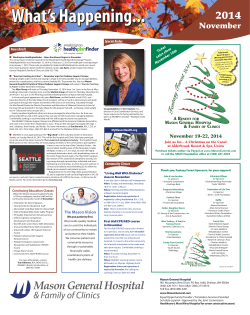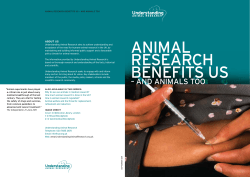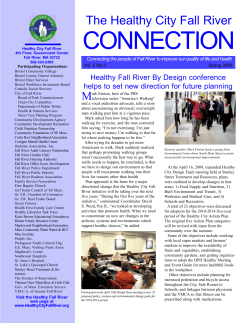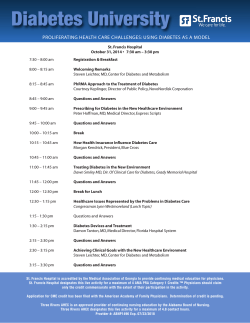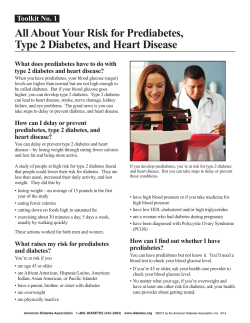
TUESDAY 2 DECEMBER 2014 THE 3
In collaboration with hosted by TUESDAY 2 ND DECEMBER 2014 THE 3 RD E.G.I.D. SYMPOSIUM: META-INFLAMMATION IN DIABETES AND ITS COMPLICATIONS 8.30AM REGISTRATION: WELCOME COFFEE AND SYMPOSIUM MATERIAL DISTRIBUTION 09.00AM FREDRIK BACKHED ROLE OF GUT MICROBIOTA IN THE PATHOGENESIS OF DIABETES Wallenberg Laboratory for cardiovascular and Metabolic Research, University of Gothenburg, Sweden Professor Fredrik Bäckhed combines clinical oriented research with gnotobiotic mouse models to address the role of the normal gut microbiota in metabolic diseases. He holds a PhD from Karolinska Institute, Sweden and performed his postdoctoral training at Washington University, St Louis. Dr Bäckhed is professor at University of Gothenburg, Director of the Wallenberg Laboratory for cardiovascular research, and co-director for Center for cardiovascular and metabolic research. In 2011 he was appointed Professor at University of Copenhagen. Dr Bäckhed has co-authored 60 research papers in international peer-reviewed journals, many of which are in high- impact journals such as Nature, Science, Cell, and Proceedings of National Academy of Sciences and has received numerous awards. 09.45AM ALAIN TEDGUI ROLE OF INNATE AND ADAPTIVE IMMUNITY IN ATHEROSCLEROSIS Paris - Cardiovascular Research Center (PARCC), Inserm U970, University Paris Descartes, Paris, France Alain Tedgui obtained his PhD thesis in Fluid Mechanics. After his post-doctoral fellowship at the Imperial College, London, he joined the French Institute of Health and Medical Research (INSERM) in 1983. He has been heading an INSERM laboratory at Paris Hospital Lariboisiere from 2000 to 2004. His is currently the Director of the PARCC (Paris - Cardiovascular Research Center) at the Georges-Pompidou European Hospital. He coordinated the European Network of Excellence EVGN (European Vascular Genomics Network) from 2004 to 2008. His primary research is aimed at elucidating the mechanisms of atherosclerosis. He bridged the interface between vascular biology and immunology in showing that a subset of immune cells, regulatory T cells, limits the development of atherosclerosis and can be used as a promising anti-atherosclerotic strategy to curtail inflammation. He acted as the European Editor of Arteriosclerosis Thrombosis and Vascular Biology from 2008 to 2012. He was awarded the 2013 Grand Prix of the Medical Research Foundation (FRM). 10.30AM COFFEE BREAK 11.00AM MARC DONATH ISLET INFLAMMATION IN TYPE 2 DIABETES Clinic for Endocrinology, Diabetes and Metabolism at the University Hospital of Basel, Switzerland Marc Y. Donath is Professor and Head of the Clinic for Endocrinology, Diabetes and Metabolism at the University Hospital of Basel, Switzerland. His main scientific contribution is the description of an inflammatory process underlying the failure of the pancreatic islet to produce sufficient amount of insulin in Type 2 diabetes, with a central role for IL-1ß. On the basis of this he initiated a pioneering clinical trial in patients with Type 2 diabetes that vindicates his hypothesis and opens the way for a causative treatment and prevention of diabetes. These studies have now entered the phase 3 of clinical trials. Furthermore he identified a new endocrine loop by showing that elevated IL-6 mediates a cross talk between insulin sensitive tissues, L cells and pancreatic islets to adapt to changes in insulin. Finally, recently Dr. Donath has uncovered the first monogenic form of type 1 diabetes. Overall this research has contributed to the concept that the innate immune system is part of the regulation of metabolism. 11.45AM POSTER SESSION / APERITIF 12.30PM LUNCH In collaboration with 02.00PM hosted by RACHEL LEPROULT THE IMPACT OF SLEEP LOSS AND CIRCADIAN MISALIGNMENT ON METABOLISM Neuropsychology and Functional Neuroimaging Research Unit, the Centre of Cognition and Neurosciences, Université Libre de Bruxelles, Brussels, Belgium Present professional position and workplace: Post-doctoral position at the Neuropsychology and Functional Neuroimaging Research Unit at the Centre of Cognition and Neurosciences, Université Libre de Bruxelles, Brussels, Belgium. My current project entitled «A neurophysiological, cognitive and biological investigation of the effects of bedtime extension as an intervention to counteract the adverse effects of chronic sleep loss» is funded by a Brains Back to Brussels, obtained from Innoviris, Bruxelles-Capitale, Belgium. Special experience, education etc. related to the topic of the presentation : B.S. in Mathematics / Statistics, Ph.D. in Biomedical Sciences, Fields of expertise include studies on sleep, in particular sleep loss and sleep extension, and its effects on glucose metabolism, hormonal profiles (in particular the endocrine system) and executive functions. 02.45PM MICHAEL TRAUNER METABOLIC CONTROL OF NASH Division of Gastroenterology and Hepatology, Medical University of Vienna, Austria Michael Trauner received his medical and postgraduate training at the Karl Franzens University School of Medicine in Graz, Austria and Liver Center at the Yale University, USA. After his return to Graz he established an internationally recognized research group for cholestatic and fatty liver diseases. In 2005 he became Full Professor of Medicine, Experimental and Clinical Hepatology at the Medical University of Graz, where he also founded the Liver Center. Since 2010 he is Professor and Chair of Gastroenterology and Hepatology at the Medical University of Vienna where he is also heading the Division. His main research interests include the molecular regulation of hepatobiliary ABC transporters and metabolic lipases in cholestatic and fatty liver diseases by nuclear receptors, mechanisms of cell injury and pharmacological treatment of cholestatic and fatty liver diseases. He has published more than 280 peer reviewed scientific papers, mainly on molecular and clinical aspects of liver diseases, and is corresponding member of the Austrian Academy of Sciences and several other National and International Professional and Scientific societies. He has served on several Editorial Boards and Scientific committees including EASL Governing Board Member (2006-2009) and Associate Editor of the Journal of Hepatology (2004-2009) and Hepatology (since 2011). 3.30AM COFFEE BREAK 04.00PM PATRICK SCHRAUWEN BROWN ADIPOSE TISSUE AND SKELETAL MUSCLE MITOCHONDRIAL FUNCTION AS TARGETS FOR THE TREATMENT OF TYPE 2 DIABETES: FOCUS ON HUMAN INTERVENTION STUDIES Dept of Human Biology, Maastricht University Medical Center, Maastricht, The Netherlands Prof. Schrauwen (1971) received a MSc degree in movement sciences at the faculty of Health Sciences of the Maastricht University in 1994. In 1998 Prof. Schrauwen received his PhD at the Maastricht University for his thesis ‘Determinants of energy and substrate metabolism’, in which human experiments on the effects of dietary fat and physical activity on body weight regulation are described. Part of his thesis was performed at the National Institutes of Health (NIH) in Phoenix (USA) where he studied molecular and genetic aspects of obesity and type 2 diabetes mellitus. In 1999 he was appointed a post-doc fellowship by NWO, in 2001 a prestigious Academy-fellowship from the Royal Dutch Academy of Arts and Sciences (KNAW) and in 2008 the prestigious VICI-fellowship from the Netherlands Organization for Scientific Research (NWO/ZonMW). For his work Prof. Schrauwen was awarded the Young Investigators Award for clinical science from the European Association for the Study of Obesity in 2001, the ‘Silver Medal Award’ from the Nutrition Society’ in 2006, the ‘Rising Star Award’ from the European Association for the Study of Diabetes (EASD) in 2008 and the Corona-Gallina Award for excellence in diabetes research in 2013. Prof. Schrauwen is associate editor of ‘Scientific Reports’ and ‘Diabetologia’. His main fields of interest concern insulin resistance, lipotoxicity and mitochondrial dysfunction with special emphasis on type 2 diabetes. The research team supervised by Prof. Schrauwen investigates whole-body, tissue and cellular physiology. To this end, molecular, genetic and whole-body techniques are used in both rodent and human models. In collaboration with the department of Radiology of the Maastricht University Hospital, Prof. Schrauwen applies noninvasive magnetic resonance spectroscopy to investigate in vivo mitochondrial function and lipid accumulation in muscle, liver and heart. 04.45pm 05.00PM Best Posters Award CONCLUSIONS In collaboration with hosted by WEDNESDAY 3 RD DECEMBER 2014 FREE ACCESS TO IDEA SUMMIT – BIOFIT CONFERENCES 8.30 AM WELCOME COFFEE 09.00AM – 10.30AM 10.30 AM 1. Michael Skjødt SØRENSEN, IDF Europe Co-opted Board Member, International Diabetes Federation, Vice president of the Danish Diabetes Association (DK) Chairman 2. Tomas LANDH, Director Strategy and Innovation Sourcing, Diabetes Research Unit, Novo Nordisk (DK) 3. Sophie MEGNIEN, Chief Medical Officer, Genfit (FR) 4. Bernard THORENS, Professor, University of Lausanne (CH) 5. Michel PINGET, President, European Center for the study of Diabetes (CEED), Chief of Diabetology, Endocrinology and Nutrition, Muller Hospital (FR) COFFEE BREAK 11.00AM – 12.30PM 12.30PM SESSION 1 2013-2014 BREAKTHROUGHS & INNOVATIONS IN THE FIELD OF DIABETES SESSION 2 WHAT DO YOU EXPECT AS A GOOD LEVEL OF MATURITY OF FINDING? TOO EARLY STAGE FOR ME GUY!! 1. Christine REYNET, Director and co-Owner McC+R&D Consulting Ltd (UK) Chairperson 2. Jan OSCARSSON, Clinical Research Physician, Global Medicines Development, AstraZeneca (SE) 3. Bart STAELS, Prof at the Faculty of Pharmacy, University of Lille 2, Director of the Inserm UMR1011, Scientific Research Advisor, Genfit (FR) 4. Florence DAL DEGAN, External Innovation, Zealand Pharma (DK) LUNCH In collaboration with hosted by 02.00PM – 03.30 PM SESSION 3 IS STRATIFIED/PERSONALIZED/PRECISION MEDICINE ONE OF THE PARADIGM ON WHICH WE COULD GRIND OUR COLLECTIVE EFFORTS FOR RESEARCH IN DIABETES? 3.30 PM 1. Leif GROOP, Prof, Senior Physician, Director, Lund University Diabetes Centre (SE) Chairman 2. François PATTOU, Pr of General Surgery, Lille University, Head of department of General Endocrine Surgery, Lille University Hospital, Director of the INSERM UMR 859 (FR) 3. Catherine LARUE, CEO, Integrated Biobanks of Luxembourg (LU) 4. Marc DONATH, Professor of Endocrinology, Diabetes and Metabolism, University Hospital Basel (CH) 5. Bernd JABLONKA, External Alliances, Diabetes Division, Sanofi (DE) COFFEE BREAK 4.00PM – 05.30PM SESSION 4 DO WE NEED A EUROPEAN JOINT DIABETES RESEARCH AGENDA? WHO SHOULD CONTRIBUTE TO IT? WHAT SHOULD BE THE GOALS OF THIS JOINT RESEARCH AGENDA? 1. Olivier ARNAUD, European Director Research, JDRF - Juvenile Diabetes Research Foundation (FR) Chairman 2. Philippe FROGUEL, MD, PhD, Professor of Diabetology, Lille University Hospital , Director of the EGID Institute FR3508 (Labex EGID), Director of the CNRS UMR8199, Lille 2 University, Pasteur Institute of Lille (FR), Professor of Genomic Medicine, Head of Department of Genomics of Common Disease, Hammersmith hospital, Imperial College, London (UK) 3. Stefanie POSSEKEL, Director Technology Management, Ascenion (DE) 4. Ulrich WENDT, External Innovation, Global Diabetes Division, Research & Translation Medicine, Sanofi (DE) 5. Philippe CUPERS, DG Research and Innovation, Head of Unit (acting) of Unit E.1 (Strategy) – Directorate Health, European Commission (BE) CONCLUSIONS
© Copyright 2025


